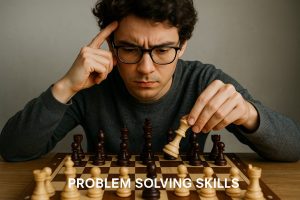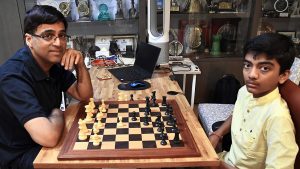Say you’re at a chess tournament. The air is thick with concentration, each player intensely focused on the board. But in the background, there’s an unsung hero keeping everything in order – the arbiter in chess. A chess arbiter, like a referee in other sports, is critical to the flow of any tournament, ensuring that players follow the rules and that the games proceed smoothly.
In India, there is a growing demand for trained, certified arbiters in chess. They are the backbone of chess tournaments, from local competitions to national championships. If you’re interested in becoming one, this guide outlines everything you need to know about the training, examination, and certification process for becoming a National Arbiter in India.
What is The Role of a Chess Arbiter?
An arbiter in chess is responsible for overseeing games, ensuring compliance with rules, and managing disputes or issues during matches. Arbiters play a vital role in preserving the integrity of chess by –
- Enforcing rules fairly across all players.
- Resolving disputes objectively and swiftly.
- Monitoring time controls and enforcing penalties if necessary.
- Ensuring a smooth, organized flow of games throughout tournaments.
Certified arbiters in chess bring credibility to competitions and uphold high standards in the chess community.
What are The Requirements for Becoming a National Arbiter in India?
Becoming an arbiter in chess in India requires meeting specific eligibility criteria set by the All India Chess Federation (AICF). Here’s a breakdown of what’s needed to get started.
Eligibility Criteria for Arbiter Candidates in India
To qualify for the National Arbiter training and examination, candidates must generally:
- Be at least 21 years old.
- Possess a basic understanding of chess rules and gameplay.
- Demonstrate interest or experience in chess tournaments, even as a player or spectator.
Educational and Skill Prerequisites
While no formal educational background is strictly required, an effective arbiter in chess should have:
- Strong analytical skills and attention to detail.
- Effective communication skills for managing participants and explaining rulings.
- Basic mathematical proficiency, as it helps in handling time controls and score calculations.
Affiliation with Chess Bodies or Federations
Candidates must be registered with their state chess associations or the AICF. This affiliation ensures candidates have a credible background and access to the resources required for their training and examination.
What is The Training Program Structure of a National Arbiter?

The National Arbiter training program provides candidates with foundational knowledge and practical skills needed to officiate tournaments. Here’s what the program covers:
Components and Modules of the Training Program
The training program is structured into modules that include:
- Chess Rules and Regulations: A comprehensive overview of FIDE (Fédération Internationale des Échecs) rules.
- Tournament Management: Insights into managing tournaments, organizing matches, and handling logistics.
- Dispute Resolution: Techniques to address disputes and ensure fair play.
Duration and Format of the Training
Typically, the National Arbiter training program lasts 2-4 days. Conducted in both online and in-person formats, the course includes workshops, lectures, and interactive sessions with experienced arbiters in chess.
Key Areas of Focus: Rules, Regulations, and Practical Scenarios
The training emphasizes understanding FIDE rules and applying them in various scenarios. Trainees also practice through simulated games and mock disputes, gaining hands-on experience in rule enforcement, player management, and tournament conduct.
What is The Arbiter Examination Process Like?
Following the training, candidates must pass an examination to become certified. Here’s what the examination entails:
Structure of the Examination: Written and Practical Components
The arbiter examination typically comprises:
- Written Test: Covers theoretical knowledge of FIDE rules and chess regulations.
- Practical Test: Involves hands-on scenarios where candidates apply rules and resolve issues.
Topics Covered in the Examination
The exam assesses knowledge in areas such as:
- Chess rules and regulations.
- Tournament formats and scoring systems.
- Handling time controls and penalties.
- Dispute resolution protocols.
Evaluation Criteria and Passing Requirements
Candidates must score at least 75% on the exam to qualify as National Arbiters in chess. Evaluators assess both theoretical knowledge and practical application of rules, ensuring candidates are well-prepared for real-world scenarios.
Explain The Certification and Licensing Process as a National Arbiter in Chess
After passing the examination, candidates receive official certification as National Arbiters, allowing them to officiate chess tournaments in India.
Steps to Obtain Certification Post-Examination
Upon successfully passing the exam, candidates must:
- Submit their results to the AICF.
- Complete any necessary documentation and background checks.
- Pay the certification fee to receive their official license.
Validity Period and Renewal Process of Certification
Certification as a National Arbiter is valid for five years. To renew, arbiters in chess must complete refresher courses or additional exams, staying updated on new rules or changes in the game.
Obligations and Responsibilities as a Certified Arbiter
Certified arbiters in chess must adhere to the AICF’s code of conduct, remain impartial, and uphold the standards of chess officiating. They must also stay informed about updates to FIDE regulations to maintain fair play.
What are The Roles and Opportunities for Certified Arbiters in India?
Certified arbiters have diverse opportunities in India’s chess ecosystem, with options for career progression and professional growth.
Types of Tournaments and Events Requiring Arbiters
Certified arbiters in chess are essential for various events, including:
- School and college chess tournaments.
- State and national-level competitions.
- International events hosted in India.
Career Progression and Advanced Opportunities as an Arbiter in Chess
After gaining experience, National Arbiters can advance to become FIDE Arbiters or International Arbiters, allowing them to officiate at international tournaments and prestigious events.
Networking and Professional Development as Part of the Arbiter Community
Being part of the chess arbiter community offers networking opportunities, access to workshops, and continued professional development, helping arbiters refine their skills and expand their careers.
What are The Challenges and Best Practices in National Arbiters Training?

Training to become an arbiter presents challenges, but with preparation and commitment, candidates can excel.
Common Challenges Faced During Training and Examination
Arbiters face challenges such as:
- Mastering complex rules and scenarios.
- Handling high-pressure situations and making quick decisions.
- Managing players’ emotions and disputes diplomatically.
Effective Strategies for Preparation and Success
To excel, candidates should:
- Regularly Review FIDE Rules: Familiarity with FIDE regulations is key.
- Practice through Mock Tournaments: Simulations help build confidence and experience.
- Engage in Peer Learning: Discussing strategies and experiences with other arbiters enhances learning.
Importance of Staying Updated with Changes in Chess Rules
Chess is an evolving game, and rules can change. Certified arbiters in chess must regularly review updates from FIDE to maintain their knowledge and uphold fair play.
Some Chess Arbiter Exam Questions And Answers
1. How should an arbiter handle a situation where a player displaces one or more pieces during their turn?
Answer: If a player accidentally displaces one or more pieces, they must re-establish the correct position on their own time. If necessary, either player may stop the clock and request the arbiter’s assistance. The arbiter has the authority to penalize the player who displaced the pieces, depending on the circumstances.
2. What is the procedure if a game starts with the board incorrectly oriented?
Answer: If, during a game, it is found that the chessboard has been placed incorrectly (e.g., the orientation is wrong), the game shall continue, but the position reached must be transferred to a correctly placed chessboard.
3. How should an arbiter address a situation where a player uses both hands to make a move?
Answer: A player must move the pieces and press the clock using the same hand. If a player uses two hands to make a single move (e.g., in the case of castling, capturing, or promotion) and then presses the clock, it is considered an illegal move. The first completed illegal move by a player results in adding two minutes to the opponent’s clock. A second completed illegal move by the same player leads to the loss of the game.
4. What steps should an arbiter take if a player claims a draw based on the 50-move rule?
Answer: A player can claim a draw if no pawn movement or capture has occurred in the last 50 consecutive moves by each player. The player must stop the clocks and inform the arbiter of the claim. The arbiter will then verify the claim:
- If valid, the game is declared a draw.
- If invalid, the opponent is awarded two extra minutes, and the game continues.
Additionally, if any consecutive series of 75 moves have been completed by each player without any pawn movement or capture, the game is automatically drawn, except if the last move resulted in checkmate.
5. How does an arbiter handle a situation where a player makes an illegal move in rapid or blitz chess?
Answer: In rapid and blitz games, if an arbiter observes an illegal move, they must intervene immediately:
- First Illegal Move: The arbiter awards the opponent two extra minutes and reinstates the position before the illegal move.
- Second Illegal Move by the Same Player: The arbiter declares the game lost for the player who committed the illegal move.
If the arbiter does not intervene and the opponent has not made their next move, the opponent can claim a win. Once the opponent has made their next move, an illegal move cannot be corrected unless both players agree without arbiter intervention.
6. What are the requirements for obtaining the title of International Arbiter (IA)?
Answer: To be awarded the title of International Arbiter, a candidate must fulfill the following criteria:
- Demonstrate thorough knowledge of the Laws of Chess, FIDE competition regulations, Swiss Pairing Systems, title norms, and the FIDE Rating System.
- Exhibit absolute objectivity in all arbiter activities.
- Possess a working knowledge of the English language.
- Have basic computer skills, including proficiency with FIDE-endorsed pairing programs, word processing, spreadsheets, and email.
- Be capable of operating various electronic chess clocks.
- Attend at least one International Arbiters’ Certification Seminar with a positive evaluation.
- Gain experience as an arbiter in four events that meet specific criteria outlined by FIDE.
7. How should an arbiter manage a situation where a player claims a draw due to fivefold repetition?
Answer: A game is automatically drawn if the same position has appeared on the board for at least five consecutive alternate moves by each player. The arbiter does not require a claim from either player to declare the draw in this scenario.
8. What is the proper procedure when a player wishes to adjust a piece on the board without intending to move it?
Answer: If a player wishes to adjust a piece on its square without intending to move it, they must announce their intention by saying “j’adoube” (French for “I adjust”) or an equivalent phrase before touching the piece. This informs the opponent and the arbiter that the player is adjusting, not moving the piece
9. How does an arbiter handle a situation where a player promotes a pawn but fails to replace it with a new piece before pressing the clock?
Answer: If a player moves a pawn to the farthest rank, and presses the clock, but does not replace the pawn with a new piece, this is considered an illegal move. The pawn should be replaced by a queen of the same color as the pawn. The first completed illegal move by a player results in adding two minutes to the opponent’s clock.
Embrace the Future of Chess
Becoming a National Arbiter in India is a rewarding journey that combines a love for chess with a dedication to its integrity. As a certified arbiter in chess, you play an essential role in ensuring fair play and supporting the chess community. But the learning doesn’t stop there.

At Caissa School of Chess, you can continue refining your skills with a complete curriculum designed for serious learners and aspiring professionals. With live classes led by top grandmasters who’ve coached chess prodigies like Gukesh and Arjun, peer-to-peer learning groups to build knowledge collaboratively, and add-on classes for comprehensive growth, Caissa provides a well-rounded chess education.

From regular assignments to practice tournaments, Caissa helps you stay sharp, whether you’re managing a tournament or preparing for one.














